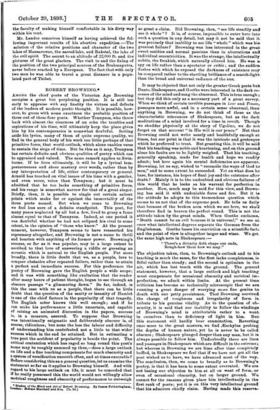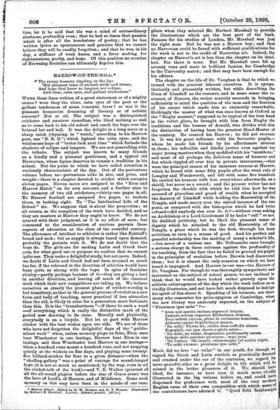ROBERT BROWNING.•
AMONG the chief poets of the Victorian Age Browning occupies a great but perplexing position. It is still too early to appraise with any finality the virtues and defects of the leaders of modern poetic thought. It is possible, how- ever, to guess with some exactness the probable position of three out of these four poets. Whether Tennyson, who threw back with almost the clearness of an echo the troubles and aspirations of his time, will ultimately keep the place given him by his contemporaries is somewhat doubtful. Setting aside his lyrics, many of them of quite supreme quality, we find in the general body of his work too little perhaps of that primitive force, that world-outlook, which alone enables verse to sustain the siege of time. But be this as it may, Tennyson has certain definite and obvious qualities of poetry which can be appraised and valued. The same remark applies to Swin- burne. If he lives ultimately, it will be by a lyrical tem- pestuousness and sheer mastery over words, rather than by any interpretation of life, either contemporary or general. Arnold has touched on vital issues of his time with a gentler, and even surer, voice than Tennyson ; but it must be admitted that he too lacks something of primitive force, and his range is somewhat narrow for that of a great singer. Briefly, then, it is possible to single out certain salient points which make for or against the immortality of the three poets named. But when we come to Browning we feel less sure of a definite standpoint. This poet, for many years neglected by all but a few, lived to grasp a fame almost equal to that of Tennyson. Indeed, at one period it was doubtful whether he had not eclipsed his rival to some extent, in the opinion of "those who know." At the present moment, however, Tennyson seems to have reasserted his supremacy altogether, and Browning is not a name to thrill and hearten with anything of its former power. Browning's success, so far as it was popular, may to a large extent be ascribed to that love of answering a riddle or guessing an acrostic which is natural to the English people. Put more broadly, there is little doubt that we, as a people, love to conquer obstacles after repeated failure, rather than to attain a perfect and immediate success. For this preference the poetry of Browning gave the English people a wide scope; and it was with something like exaltation that the reader after many hours of patient thought, began to see through an obscure passage "a glimmering dawn." So far, indeed, is this the case with us as a people, that there can be little doubt that the question of the sanity or insanity of Hamlet is one of the chief factors in the popularity of that tragedy. The English actor knows this well enough; and if he can make his performance a little uncertain, and capable of raising an animated discussion in the papers, success is, in a measure, assured. To suppose that Browning was intentionally enigmatic and deliberately obscure is, of course, ridiculous; but none the less the labour and difficulty of understanding him contributed not a little to that wider success which in the end he attained. But in estimating a true poet the accident of popularity is beside the point. The critical contention which has raged so long round this poet's name may be roughly summed up thus,—does a large outlook on life and a fine teaching compensate for much obscurity and a system of versification uncouth often, and at times execrable P Before considering this as a general question, let us examine the statement so far as it applies to Browning himself. And with regard to his large outlook on life, it must be conceded that If he really possessed this the world would not willingly allow metrical roughness and obscurity of performance to outweigh ' Studios of the Mind and Art of Robert Browning. By James Potheringhsna. London: Horace Marabail and don. [7s. dd.]
so great a claim. Did Browning, then, " see life steadily and see it whole " ? It is, of course, impossible to enter here into such a question in any detail, but may it not be said that it was precisely that inability to see life " whole " which was his greatest failure? Browning was less interested in the great sweet sanities and normal passions than in aberrations and individual eccentricities. It was the strange, the intellectually subtle, the freakish, which naturally allured him. He was spy on life rather than a spectator or critic ; and the sudden flashes with which he exposed the darkness of existence may be compared rather to the startling brilliance•of a search-light than the broad and universal radiance of the sun.
It may be objected that not only the greater Greek poets but Dante, Shakespeare, and Goethe were interested in the dark re- cesses of the mind and sang the abnormal. This is true enough.; but they did this only as a necessary part of a great survey. When we think of certain terrible passages in Lear and Tinian, passages more awful, and in a certain sense abnormal, than anything in Browning, we do not think of these as the characteristic utterances of Shakespeare, but as the dark meditations of a mind involved for a time in revolt Though we shudder physically at the story of Ugolino, we do not forget on that account "in His will is our peace." Not that Browning could not write sanely and healthfully enough at times, but our point is that it was the intricate and grotesque which he preferred to treat. But granting this, it will be said that his teaching was noble and heartening, and on this ground alone his faults are to be lightly weighed. That his teaching-, generally speaking, made for health and hope we readily admit ; but here again his mental deficiencies are apparent. Browning, let us say, wished to " reconcile the ways of God to men," and to some extent he succeeded. Yet on what does he base, for instance, his hopes of final joy and the existence after death ? Mainly it is to the undoubted and obvious failures of this world that he looks as his warrant for perfection in another. Now, much may be said for this view, and Brown- ing has said it with undeniable force and fire. But it is the attitude he adopts to this tremendous question which seems to us not that of the supreme poet. He tells us flatly that because of the broken arcs, which we see here, we shall therefore find in heaven the perfect round. This is not the attitude taken by the great minds. When Goethe exclaims. "Death cannot be an evil because it ie universal," we see at once what intellectual degrees separate the German from the Englishman. Goethe bases his conviction on a scientific fact, and the point of view is altogether larger and wiser. We get. the same high note in Shakespeare:— " There's a divinity doth shape our ends,
Rough-hew them how we may."
The objection taken, then, to Browning's outlook and to his teaching is much the same, for the first. lacks completeness, is fitful rather than steady; and the second is optimism in the air, which has lost touch with the ground. The general statement, however, that a large outlook and high teaching must compensate for occasional obscurity and metrical im- perfection, we admit within limits. At the present time criticism has become so technically microscopic that we are running a great danger of worrying some fine genius to death with our petty persistence. That Browning survived the charge of roughness and irregularity of form is tribute to his genuine vitality. As to the question of ob- scurity, it is said that our inability to follow the windings. of Browning's mind is attributable rather to a want in ourselves than to deficiency of light in him. But this statement will hardly bear examination. Reverting once more to the great masters, we find Eschylus probing the depths of human nature, yet he is never to be called obscure ; Shakespeare plunged deeper than any man, but it is always possible to follow him. Undoubtedly there are lines and passages in Shakespeare which are difficult in the extreme; but whereas in Browning we are time after time completely baffled, in Shakespeare we feel that if we have not got all the poet wished us to have, we have advanced most of the way.. The conclusion, then, we come to broadly as to Browning's poetry, is that it has been to some extent overrated. We are not basing our objection to him at all on want of form, or even of occasional obscurity, but on larger ground. We cannot for the reasons given place him intelleotually in the first rank of poets; yet it is on this very intellectual ground that his admirers chiefly claim. Having made this reserve- tion, let it be said that his was a mind of extraordinary alertness, profundity even; that he had at times that passion which is after all the touchstone of poetry ; that he has written lyrics so spontaneous and genuine that we cannot believe they will be readily forgotten ; and that be was, in his day, a stiffener of weak knees, and a force making for righteousness, purity, and hope. Of this position no number of Browning Societies can ultimately deprive him.







































 Previous page
Previous page